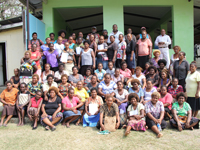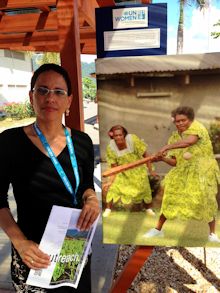Turning good intentions into action
Date:
As we enter the final 12 months of global stocktaking and agenda setting for the post-2015 development agenda, we have the responsibility to define with sufficient clarity the world that we want and to do more than describe but also to prescribe and articulate how that world will be more assuredly realised.

Female market vendors in Honiara, Solomon Islands, commemorate taking part in a UN Women workshop. Credit: UN Women/Marni Gilbert.
The world we envisage is one where alienation and depletion of the world’s resources for the benefit of the few is unacceptable. A world where there is accountability to the many for a fair distribution of access to and benefits from such resources. A world where production and consumption are informed by an internalised appreciation of planetary limits; and within this, a world where gender equality, human rights and peace become a lived reality, realised through solidarity, mutuality and practice.
To achieve these goals, empowering the majority is a precondition and a moral imperative. In particular, we must end historic, persisting exclusions and harmful cultural practices, ensuring that women have equal opportunities to participate, influence and benefit from political, social and economic governance whether at community, national or international levels. This will be a primary indicator of accountability to commitments taken in the post-2015 and SIDS Agendas.
The realisation of the human rights of women and girls is a pre-requisite for poverty eradication and sustainable development. This was validated by Member States at the Conference on Sustainable Development (Rio+20), and more recently, by the Open Working Group on Sustainable Development Goals that has proposed a stand-alone goal ‘to achieve gender equality and empower women’, with targets that aim to eliminate the root causes of discrimination.
Likewise the SAMOA Pathway seeks to address the root causes of inequalities and multiple forms of discriminations that affect women and girls as key to accelerating inclusive growth, sustainable development, peaceful societies and security. To assure these goals we must, amongst other actions:
- Eliminate all forms of discrimination
- End all forms of violence against women and girls;
- Strengthen women’s economic empowerment and ensure access to productive employment and decent work;
- Ensure women’s equal access to ownership and control over land, credit, natural resources and appropriate technology;
- Achieve universal access to sexual and reproductive health and reproductive rights;
- Guarantee women’s equal representation in the decision-making processes which shape their lives;
- Enable women’s participation in peace and post conflict processes.
SIDS are faced with formidable challenges given their vulnerabilities to external shocks, whether from extreme disaster-producing weather events, climate change or global economic shifts. These vulnerabilities are associated with size, economies of scale and asymmetries of power. External and internal vulnerabilities have resulted in high levels of indebtedness for many SIDS, which undermine the states’ capacities to meet socio-economic development obligations.

Roberta Clarke, Regional Director for Asia-Pacific for UN Women
But we have also heard about the resilience that comes from inclusive socio-economic growth strategies, facilitated by development cooperation and a global partnership attuned and responsive to the specificity of SIDS.
In SIDS, where women carry the disproportionate responsibility for the care of children, they are standard bearers of resilience. But we ought not to take this for granted. Rather, everywhere, women must be supported in their capacities, whether in the formal, informal or care economies, as this is the key to family, community, national and global wellbeing. This is the experience of UN Women’s work in partnership with women market vendors in the Pacific.
Inclusiveness therefore is at the heart of the solution to redress inequalities both within and between states. Green and blue growth can only be realised when we assure equal and equitable opportunities and resources for women and men in both the productive and reproductive spheres.
We now call for action to implement these commitments; action that focuses on ending the implementation deficit which hinders progress on equality, development and peace for all.
We need legal frameworks, macroeconomic policies, social protection floors, and environmental and climate policies that ensure women equally participate in and benefit from growth. We need sufficient finance, investments, capacity building, training, education, transfer of technology and multi-stakeholder partnerships.
The SIDS Conference asks that we match our words with actions.
As we move towards the 20th anniversary of the world’s adoption of the Beijing Platform for Action, for UN Women, commitments on gender equality enshrined in international and regional legal and policy documents are all crucial for the wellbeing of women and girls in SIDS. They must inform the shaping of the post-2015 development agenda and the preparations for new agreements on climate change and disaster risk reduction.
UN Women is committed to working with Member States, regional organisations and civil society, as well as the UN system, to ensure that women are equal contributors and beneficiaries in the implementation of the Samoa Pathway.Gender equality is a societal responsibility and requires the involvement, actions, commitment and will of everyone for it to become a lived reality for all.
Related link: